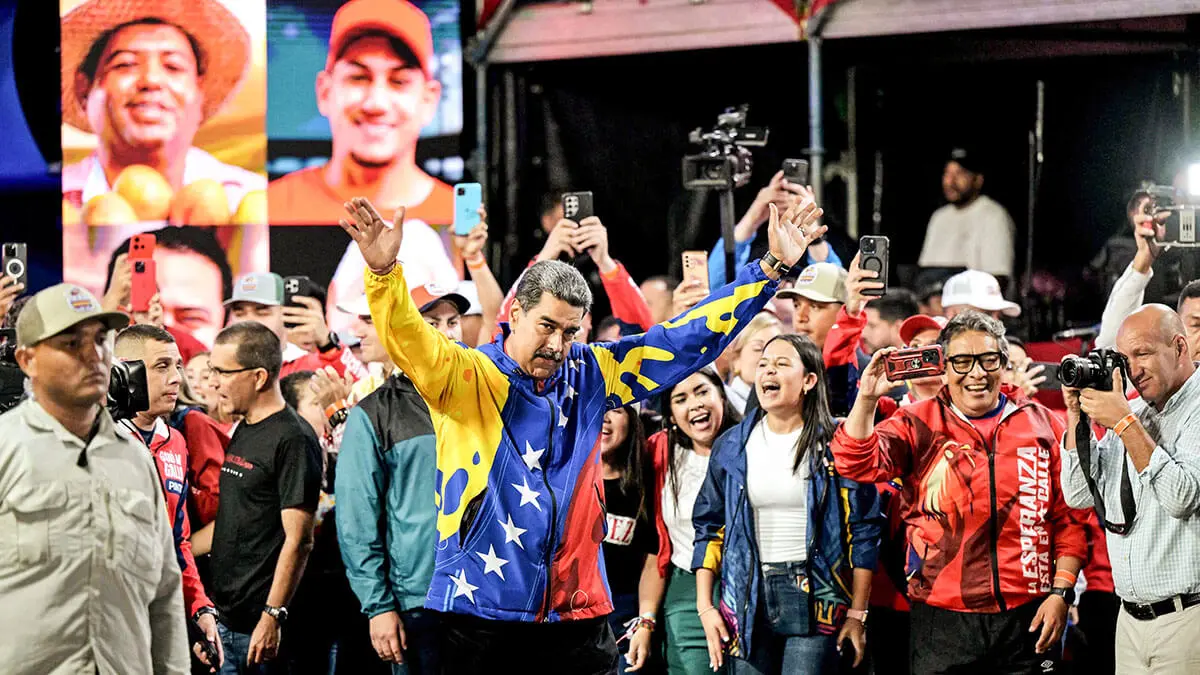The predicted: Maduro digs in and prefers bloodshed

According to the National Electoral Council (CNE), Venezuela's presidential elections were won by Nicolás Maduro with 51.20% of the vote, compared to 44.2% for the opposition candidate, Edmundo González Urrutia. All this, after supposedly 80% of the votes had been counted.
Of course, these official results have nothing to do with the exit polls, nor with the reports transmitted by the CNE itself to the opposition supervisors, which coincided in the overwhelming victory of the opposition candidate with 70% of the votes, as detailed by the strong woman of the opposition coalition, María Corina Machado.
There is no doubt that Maduro himself knew perfectly well at midday on Sunday that he had lost the elections. His statements in which he assured for the first time in his life that he would recognise ‘the official result’, followed by a call for all opposition forces to do the same, gave him away. He knew at the time both that the ballot boxes were being stuffed with votes against him and of the engineering underway to work the miracle of turning a resounding defeat into a more or less acceptable victory.
But so gross and obvious has the fraud been that no country or international institution of proven prestige and solvency has dared to endorse these ‘official results’. Some stridently denounce the electoral fraud. Others, more restrained and with the diplomatic prudence with which they pronounce themselves, have not ceased to demand ‘transparency’ in the count and in the transmission of the data. That these would be conspicuous by their absence was already known in advance, since Chavismo took great care to prevent the presence of international observers and witnesses who were not of proven loyalty to the so-called Bolivarian Revolution.
Among the few admitted, the former Prime Minister of Spain, José Luis Rodríguez Zapatero, who has yet to explain who has paid for his more than 50 trips and stays in Venezuela since he began his passionate love affair with Venezuelan Vice-President Delcy Rodríguez, who always addresses him as ‘My Prince’, figures prominently.
The Bolivarian framework in Venezuela, like that of any tyranny, has been perfected to the point of making it practically impossible not only for the alternation of power, but also for the simple existence and free activity of an opposition worthy of the name. The country may descend into the hells of collective ruin, but there will always be a ‘nomenklatura’ of privileged members of the regime above it, in control of all the economic and financial levers, well protected by security forces whose effective leadership is held by the Cuban intelligence services, which have already amply accredited the maintenance in power of the descendants of Castroism.
Havana, the real nerve centre of the political philosophy that permeates the Puebla Group, conveys to its acolytes that ‘once power has been conquered, it will not be relinquished under any circumstances’. In this regard, it is worth recalling that the leader of the Nicaraguan Sandinista Revolution, Daniel Ortega, once suffered a democratic syncope, which led to the holding of fair elections and, consequently, Violeta Chamorro's four years at the helm of the country. Ortega was then recalled to Cuba, where the Castros berated him with such intensity that ‘Danielito’ has ended up imposing a dictatorship in Nicaragua that is just as severe, if not more so, than the one in Cuba.
This same slogan has been transmitted to Nicolás Maduro as many times as the Venezuelan president visits the island to receive instructions and review the fundamentals of a good tyranny.
The courageous María Corina Machado, who, despite all the obstacles, obstacles and even attacks bordering on assassination imaginable, has never ceased to reach out to a corrupt regime and advocate reconciliation, will, like the entire opposition, cry out against this new and brutal mass fraud, which will cause frustration among the eight million Venezuelans in exile and their families, anxious to end such a long and forced separation. Maduro, well backed by his two strongmen, Diosdado Cabello and Vladimir Padrino, will not care, even if there is a new and massive exile that will spread to the rest of Latin America, with Brazil and Colombia in the lead, in addition to those who will seek in Spain the shelter and protection that the Chavista tyranny does not offer them.
A good psychologist friend of mine reminds me of one of the dogmas of her speciality: ‘Every time you generate an expectation, you are planning your next frustration’. Millions of Venezuelans, and with them so many friends and democrat sympathisers, had wanted to believe that this time the regime would not dare to fabricate such a gigantic fraud in order to continue sinking the roots of what many describe as a narco-state. Their frustration is all the greater because their expectations had led them to believe that extreme left-wing tyrannies retain a shred of shame.

